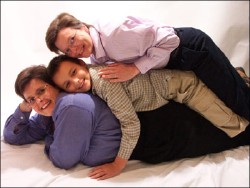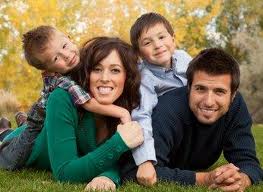Lesbian Moms Messed Me Up
August 17, 2012

Raising a heterosexual child in a homosexual environment is child abuse. But this doesn't stop the Illuminati's "useful idiots" from working to destroy the nuclear family. The ultimate goal is for the State to take over human reproduction, Brave New World style.
Robert Lopez was raised by two lesbians. Here, he reveals how damaging this experience is.
by Robert Lopez
(Abridged by henrymakow.com from THE PUBLIC DISCOURSE)
Quite simply, growing up with gay parents was very difficult, and not because of prejudice from neighbors. ... When your home life is so drastically different from everyone around you, in a fundamental way striking at basic physical relations, you grow up weird.
I have no mental health disorders or biological conditions. I just grew up in a house so unusual that I was destined to exist as a social outcast.
My peers learned all the unwritten rules of decorum and body language in their homes; they understood what was appropriate to say in certain settings and what wasn't; they learned both traditionally masculine and traditionally feminine social mechanisms.
Even if my peers' parents were divorced, and many of them were, they still grew up seeing male and female social models. They learned, typically, how to be bold and unflinching from male figures and how to write thank-you cards and be sensitive from female figures.
These are stereotypes, of course, but stereotypes come in handy when you inevitably leave the safety of your lesbian mom's trailer and have to work and survive in a world where everybody thinks in stereotypical terms, even gays.
 I had no male figure at all to follow, and my mother and her partner were both unlike traditional fathers or traditional mothers. As a result, I had very few recognizable social cues to offer potential male or female friends, since I was neither confident nor sensitive to others.
I had no male figure at all to follow, and my mother and her partner were both unlike traditional fathers or traditional mothers. As a result, I had very few recognizable social cues to offer potential male or female friends, since I was neither confident nor sensitive to others. Thus I befriended people rarely, and alienated others easily. Gay people who grew up in straight parents' households may have struggled with their sexual orientation; but when it came to the vast social universe of adaptations not dealing with sexuality--how to act, how to speak, how to behave--they had the advantage of learning at home. Many gays don't realize what a blessing it was to be reared in a traditional home.
My home life was not traditional nor conventional. I suffered because of it, in ways that are difficult for sociologists to index.
Both nervous and yet blunt, I would later seem strange even in the eyes of gay and bisexual adults who had little patience for someone like me. I was just as odd to them as I was to straight people.
Life is hard when you are strange. Even now, I have very few friends and often feel as though I do not understand people because of the unspoken gender cues that everyone around me, even gays raised in traditional homes, takes for granted. Though I am hard-working and a quick learner, I have trouble in professional settings because co-workers find me bizarre.
In terms of sexuality, gays who grew up in traditional households benefited from at least seeing some kind of functional courtship rituals around them. I had no clue how to make myself attractive to girls.
When I stepped outside of my mothers' trailer, I was immediately tagged as an outcast because of my girlish mannerisms, funny clothes, lisp, and outlandishness. Not surprisingly, I left high school as a virgin, never having had a girlfriend, instead having gone to four proms as a wisecracking sidekick to girls who just wanted someone to chip in for a limousine.
When I got to college, I set off everyone's "gaydar" and the campus LGBT group quickly descended upon me to tell me it was 100-percent certain I must be a homosexual. When I came out as bisexual, they told everyone I was lying and just wasn't ready to come out of the closet as gay yet.
THE GAY UNDERWORLD
Frightened and traumatized by my mother's death, I dropped out of college in 1990 and fell in with what can only be called the gay underworld. Terrible things happened to me there.
It was not until I was twenty-eight that I suddenly found myself in a relationship with a woman... I call myself bisexual because it would take several novels to explain how I ended up "straight" after almost thirty years as a gay man. I don't feel like dealing with gay activists skewering me the way they go on search-and-destroy missions against ex-gays, "closet cases," or "homocons."
Though I have a biography particularly relevant to gay issues, the first person who contacted me to thank me for sharing my perspective on LGBT issues was Mark Regnerus, in an email dated July 17, 2012. I was not part of his massive survey, but he noticed a comment I'd left on a website about it and took the initiative to begin an email correspondence.
Forty-one years I'd lived, and nobody--least of all gay activists--had wanted me to speak honestly about the complicated gay threads of my life. If for no other reason than this, Mark Regnerus deserves tremendous credit--and the gay community ought to be crediting him rather than trying to silence him.
Regnerus's study identified 248 adult children of parents who had same-sex romantic relationships. Offered a chance to provide frank responses with the hindsight of adulthood, they gave reports unfavorable to the gay marriage equality agenda. Yet the results are backed up by an important thing in life called common sense: Growing up different from other people is difficult and the difficulties raise the risk that children will develop maladjustments or self-medicate with alcohol and other dangerous behaviors. Each of those 248 is a human story, no doubt with many complexities.
Like my story, these 248 people's stories deserve to be told. The gay movement is doing everything it can to make sure that nobody hears them. But I care more about the stories than the numbers (especially as an English professor), and Regnerus stumbled unwittingly on a narrative treasure chest.
So why the code of silence from LGBT leaders? I can only speculate from where I'm sitting. I cherish my mother's memory, but I don't mince words when talking about how hard it was to grow up in a gay household. Earlier studies examined children still living with their gay parents, so the kids were not at liberty to speak, governed as all children are by filial piety, guilt, and fear of losing their allowances. For trying to speak honestly, I've been squelched, literally, for decades....
SICK SEX LEADS TO SICKNESS
Especially damning is the liberal attitude that we shouldn't be judgmental about sex. In the Bronx gay world, I cleaned out enough apartments of men who'd died of AIDS to understand that resistance to sexual temptation is central to any kind of humane society. Sex can be hurtful not only because of infectious diseases but also because it leaves us vulnerable and more likely to cling to people who don't love us, mourn those who leave us, and not know how to escape those who need us but whom we don't love. The left understands none of that. That's why I am conservative.
Our children do not arrive with clean legal immunity. As a man, though I am bisexual, I do not get to throw away the mother of my child as if she is a used incubator. I had to help my wife through the difficulties of pregnancy and postpartum depression. When she is struggling with discrimination against mothers or women at a sexist workplace, I have to be patient and listen. I must attend to her sexual needs.
Once I was a father, I put aside my own homosexual past and vowed never to divorce my wife or take up with another person, male or female, before I died. I chose that commitment in order to protect my children from dealing with harmful drama, even as they grow up to be adults. When you are a parent, ethical questions revolve around your children and you put away your self-interest . . . forever.
--------
Robert Lopez is assistant professor of English at California State University-Northridge. He is the author of Colorful Conservative: American Conversations with the Ancients from Wheatley to Whitman. This year he will be publishing novels he wrote in the 1990s and 2000s.







Jo said (August 19, 2012):
I thought it was very brave to feature this viewpoint because a lot of kids are coming of age in this situation and we'd stupid not to realize or notice the implications of that.
While I had a mom/dad, my mom died when I was young and I was raised mostly around men who were did manly things. Not that it's bad, but when you are a girl - eventually, you aren't interested in always hanging out with the guys anymore. (Unless they are cool/cute - and not 30-40 years older than you).
I related to a lot of what the author had to say because of my own experience. It was weird to be a girl and not be able to talk to my mom about growing up girly things.
My dad, of course, did the best that he could. I see that and acknowledge that. It's just tough to grow up w/out the role model that reflects you and what your life experience is going to be. (In my case, I was never going to be a man and a dad!)
I feel for the guys who grow up w/o dad because mom can be a lot of things, but she'll never be a man.
I feel for the girls who grow up w/o mom because dad can be a lot of things, but he'll never be a woman.